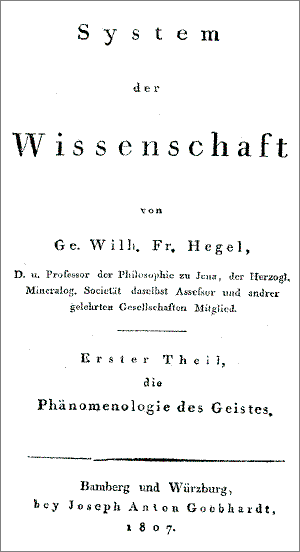Georg Wilhelm Friedrich Hegel
Philosopher who influenced Marxism, positivism and later philosophy, b. 27 August 1770 (Stuttgart, Germany), d. 14 November 1831 (Berlin).
 Hegel was the son of a public servant (revenue officer). His parents wanted him to become a priest and taught him the basics of Latin at an early age. He entered the University of Tübingen in 1788 to study philosophy and graduated in 1790. Following his parents' wishes he then enrolled for theological studies; but his graduation certificate states that he was an avid student of philosophy with only intermittent interest in theology.
Hegel was the son of a public servant (revenue officer). His parents wanted him to become a priest and taught him the basics of Latin at an early age. He entered the University of Tübingen in 1788 to study philosophy and graduated in 1790. Following his parents' wishes he then enrolled for theological studies; but his graduation certificate states that he was an avid student of philosophy with only intermittent interest in theology.
Wishing to study philosophy independently in greater depth, Hegel established himself in Bern (Switzerland) as a private tutor. He valued Kant's philosophy but declared that it placed unjustified limitations on reason. In 1796 he obtained a tutorship in Frankfurt am Main (Germany) and began to work on his own system of the mind.
Hegel's early work shows its critical analysis of religion. In 1798 he wrote: "Church and state, worship and life, piety and virtue, spriritual and worldly action can never dissolve into one."
The death of his father in 1799 brought an inheritance which allowed Hegel to become a Privatdozent (a lecturer who earns his living by offering lectures at a university) in Jena. In 1807 he published Die Phänomenologie des Geistes ("The Phenomenology of Mind"), which describes the development of the human mind as a rise through the stages of
- consciousness
- self-consciousness
- reason
- spirit
- religion
- absolute knowledge
His work did not bring him enough income to support himself, so he accepted the position of high school rector in Nürnberg in 1806. He continued to work on his system of philosophy and published his second major work, Die Wissenschaft der Logik ("Science of Logic") in two parts in 1812 and 1816.
As a result of the publication he was offered a professorship in Erlangen, Berlin and Heidelberg. He accepted the position in Heidelberg, but a renewed offer in 1818 made him move to Berlin, where he remained for the rest of his life. He died during the cholera epidemic of 1831.
Hegel's work is nothing less than an attempt to explain the universe on the basis of observation. History and science on one side, theology and philosophy on the other are the cornerstones of his system, outlined in 1817 - 1818 in Encyklopaedie der philosophischen Wissenschaften in three parts ("Encyclopaedia of the Philosophical Sciences": "Logic", "Nature" and "Mind") and in later works. To achieve his goal Hegel developed the dialectical method: The discourse or struggle between two opposing views, thesis and antithesis, is overcome in the synthesis, which unites the essence of both on a higher level, thus creating a new quality.
Hegel was arguably one of the most important philosophers of all time. His influence on later thinkers has been immense. Critical analysis of his religious roots - Hegel always regarded philosophy as a means to implement God's universal plan - characterized the writings of early existentialism espoused by Kierkegaard and others. Marx ignored all religious connotations and adopted Hegel's method when he formulated his dialectic materialism.
Reference
Knox, T. M. (1995) Georg Wilhelm Friedrich Hegel. Encyclopaedia Britannica 15th ed.
Portrait: public domain (Wikipedia)

Illustration: public domain
home
 Hegel was the son of a public servant (revenue officer). His parents wanted him to become a priest and taught him the basics of Latin at an early age. He entered the University of Tübingen in 1788 to study philosophy and graduated in 1790. Following his parents' wishes he then enrolled for theological studies; but his graduation certificate states that he was an avid student of philosophy with only intermittent interest in theology.
Hegel was the son of a public servant (revenue officer). His parents wanted him to become a priest and taught him the basics of Latin at an early age. He entered the University of Tübingen in 1788 to study philosophy and graduated in 1790. Following his parents' wishes he then enrolled for theological studies; but his graduation certificate states that he was an avid student of philosophy with only intermittent interest in theology.